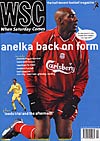 Ken Sproat looks at why Lee Clark left Newcastle United – for local rivals Sunderland
Ken Sproat looks at why Lee Clark left Newcastle United – for local rivals Sunderland
To the sort of people who produce WH Smith adverts, and Bobby Davro, Paul Gascoigne is the living embodiment of the typical Geordie. More representative of the area, however, inasmuch as every estate seems to have dozens, are charvers – image obsessed teenagers standing outside 8-til-late shops comparing tracksuits, trainers and baseball caps. Though some cause a nuisance they are, after all, sons and daughters who love their mams and dads.
In the late Eighties and early Nineties, when relegation and poverty made it unavoidable, Newcastle United threw young players into the first team. One of these players was the England Schoolboys captain Lee Clark. He looked every inch the charver you’d seen loitering around the Metro station on your way to St James’ Park. As his ability caught the attention on the field, interviews revealed an honest and personable but shy young man who supported Newcastle as much as anyone in the Gallowgate End. If anyone could do something to pull round a desperate team performance with some skill or, more likely, an incisive pass, it would be Clark.
He impressed, even though the drawback of an inexperienced and somewhat cavalier defence behind him tended to blow all his good work. However, when the arrival of Kevin Keegan invigorated the ailing team, Clark enjoyed a quantum leap in form. Instead of carving out consolation goals, his busy but smooth talents were used to superb effect as the Magpies raced away with the First Division title.
Lee Clark’s motivation was simple – to play, and play well, for his home town team. Though a bit of a reluctant hero when in contact with fans, and hardly the dirtiest player on the field, his commitment to his ideal meant that most of his fellow players had had occasions to scuffle with him in training. Such was his tenacity he would square up to anyone apart from the ex-soldier (and unarmed combat expert) Pavel Srnicek. If any player was going to throw the proverbial teacup in a dressing room if his team was getting beat it would be Lee Clark, no doubt feeling exactly the same way about the performance around him as the fans at the match.
This side of Clark tended to remain hidden from public view until he impudently kicked the magic sponge bucket on being substituted by Keegan in front of a national TV audience. Like a demanding charver being ticked off by a worn-out parent in the Metro Centre he was very publicly admonished. Things were never really the same again and, with Keegan gone, there was a sickening inevitability about his transfer from the club. Clark was never a regular at Dalglish’s Newcastle and it was seen as a bitter tragedy when he left – for Sunderland. As Dalglish filled his team with huffers, puffers and fluffers it was always at the back of the mind that a few miles down the road was a player Newcastle could desperately do with.
Dropping down a division added to the opinion that perhaps he wasn’t top-flight material. However, Sunderland fans quickly began to appreciate what the Newcastle fans knew well – Clark’s passing and running could be at the core of an attractive, successful side. Sunderland gained promotion but Clark didn’t get to play for them in the Premiership. Supporting Newcastle at the 1999 FA Cup final he was photographed wearing a T-shirt some United fans had just given him. Big deal? It was when it displayed the slogan “Sad Mackem Bastards”. Clark regretted the incident but is honest enough to say it had been a mistake to go to Sunderland in the first place.
“Everyone knows I’m Newcastle through and through. When I left, the prospect of staying in the north east, close to my family, was the big pull in going to Sunderland. But when we went up it dawned on me what that really meant. I would have to go to Newcastle the following season as a Sunderland player. I couldn’t do that.”
Although he committed what in theory should be the ultimate “betrayal” in moving to Newcastle’s closest rivals, Clark has not lost his following at St James’ (possibly the T-shirt helped). Unlike some locally born players who leave Newcastle – Chris Waddle in particular and Paul Gascoigne to a certain extent – Lee Clark will always be welcome back.
From WSC 180 February 2002. What was happening this month